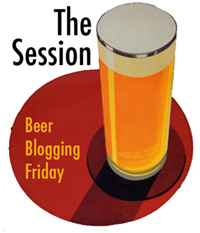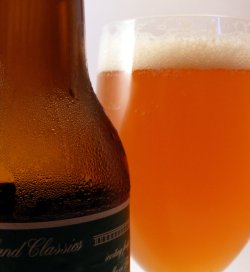
Versión castellana
It’s January, not many winters ago. We’re in the Altstadthof, a brewpub in Nuremberg, and we’ve just decided that the “Rothes” beer we’ve just drunk three pints of is the best beer we’ve ever tasted. We look at each other and decide we’ve fallen in love with beer.
We decide we want to learn more about it — how can the “lager” we’ve been told is the root of all evil be so wonderfully varied? How do they make this amazing stuff? And so an obsession is born from a brief winter holiday.
We picked Nuremberg for a destination as (a) the flights were incredibly cheap (b) it seemed like an interesting place, especially if you like history and central European winters. I also booked a few days “surprise” holiday in the lovely Hotel Nepomuk in Bamberg, as a birthday treat for Bailey. I chose Bamberg because I’d heard it was pretty, and had a recommendation for the hotel in question. (It’s a classy joint — fellow beer-blogger Evan Rail celebrated his honeymoon there recently.)
 So we planned a trip to the beer mecca that is Franconia, without beer being a motivation, and without really knowing much about beer at all. I’m not saying we’re experts now, but at the time we didn’t know our Dunkel from our Dunkel-Weiss, and nor did we care. In those days we drank real ale, but also “normal” lager. We weren’t sufficiently interested in beer to pick a pub on the basis of it, let alone a holiday destination.
So we planned a trip to the beer mecca that is Franconia, without beer being a motivation, and without really knowing much about beer at all. I’m not saying we’re experts now, but at the time we didn’t know our Dunkel from our Dunkel-Weiss, and nor did we care. In those days we drank real ale, but also “normal” lager. We weren’t sufficiently interested in beer to pick a pub on the basis of it, let alone a holiday destination.
That changed with this holiday.
We noted from the guidebook that Bamberg was famous for its breweries, and that people visited from all over the world to try the products from the nine (or is it ten? or eight?) breweries. That’ll be fun, we thought, gives us something to do. The rest is a bit of a blurry haze — I couldn’t tell you which ones we visited without seeing them again (at least two were shut) or what beers we liked. I remember Rauchbier, but I don’t think I liked it particularly at the time. I remember being surprised and bewildered by the different names and types of beer, and trying to work out what the difference was between a pils and a helles.
By the time we got back to Nuremberg, we were eager to try everything we could get our hands on. Then came the afternoon in the Alstadthof, and we were hooked.
We’re going back to Nuremberg and Bamberg in a couple of months, armed with a bit more knowledge. We’ve already been back to the Alstadthof, and the Rothes is still our favourite beer in the world.
For more on drinking in Nuremberg, see our post from June last year.
For the session announcement, see here. Let us know about your entry by leaving us a comment here or sending us an email – boakandbailey “at” gmail “dot” com
Boak




